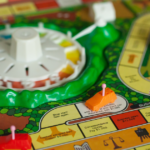






What You Need to Know About Leaving Kids Alone
As parents, we tend to keep our children close. Yet the older they become, the more childhood independence they crave. This push and pull of keeping them safe and wanting to raise independent, confident kids is a natural part of the process. Yet, it’s hard to know when to leave kids alone.
My son zoomed further away on his new yellow micro scooter and matching banana yellow crocs through our suburban neighborhood. Even from a distance, his exuberance soared. A sense of pride lifted my shoulders at his newfound bravery. Soon he became a yellow dot on the horizon. But then I began to worry. What would the neighbors think? Should he be so far from me? Will someone call child protective services (CPS)?
Worrying about being seen as a terrible parent isn’t new for me. I’ve had CPS called before. Investigators ruled the incident unfounded, but still, the fear lingers. I’ve realized since then, that every choice I make as a mom can be called into judgment. Everything.
Parents aren’t criminals for safely leaving kids alone.
But my story isn’t an isolated incident, as Diane Redleaf points out in “Narrowing Neglect Laws Means Ending State-Mandated Helicopter Parenting.” There are many cases of parents making sound decisions about leaving their children alone and being criminalized or investigated.
There was the mom who left her son for a few minutes in a car to buy headphones at Target. Authorities slammed her with contributing to the delinquency of a minor.
And another mom asked her 8-year-old daughter to walk the dog around the block. They investigated her for child neglect.
Additionally, a bold set of parents had the nerve to allow their children to walk home from the park. Alone.
The single mom who watched her three kids play at a park across the street, was charged with child neglect.
Growing up in the 80s and 90s, walking home from school, going to the park, or even running errands was routine. As long as you were home before dinner. But how did this change?
Where did this constant fear come from?
According to researchers, many parents have adopted the belief that children are in constant danger. Sensationalized cases feed the news cycle, so parents keep their children close out of fear. This creates an idea that kids can’t be left alone for any period, so we’ve normalized the idea of overprotection and helicopter parenting. However, it’s important to remember that rates of all kinds of crimes have plummeted in the past few decades.
When some neighbors see kids alone, they call child protective services. Even if parents want to give their children more freedom, some don’t out of fear of being judged or criminalized. Being in a car is more likely to harm your child than letting them walk home from school alone, yet these are perfectly reasonable choices. When something questionable happens, one of the first thoughts is: Where was the mother, and why?
The new normal is that no child can be unsupervised. The result is that people perceive the danger to be higher, resulting in a self-reinforcing feedback loop. Researchers showed that the perceived risk of a child being left alone has to do with the reasoning behind their absence and whether this is intentional or unintentional. This distinction determines how dangerous the situation is for the child.
Take a look at the different advocacy routes Let Grow endorses.
Redleaf discusses child protection laws and approaches to advocacy. She states that child protection laws are unclear and extensive. The regulations also vary by state and may have no apparent specificity of when it’s okay and not okay to leave your child alone.
As parents, you may feel fine leaving your kids alone unsupervised or scooting through the neighborhood, but child protection laws may inhibit you from making that assessment.
Let Grow supports different approaches to advocacy and legislation, including:
- Illinois Approach: This method pushes for a stricter definition of child neglect. It’s not merely letting your child play outside alone. Instead it questions whether the parent ignored serious dangers to the child. In essence, a blatant disregard for their well-being.
- Utah “Free-Range” Law: Gives children the right to engage in independent activities when deemed ready by parents and not thrust into unreasonable risk or harm. Examples of these activities include walking or biking outside, waiting in a car, or engaging in outdoor play. The law helps parents not become criminalized for allowing their children independence.
- The Colorado Proposal: Modeled after the Utah “Free-Range” Law, this would allow kids to engage in independent activities when determined mature enough by a reasonable and prudent parent. Children should be given the gift of unsupervised play, and parents can provide this without criminalization.
In How to Raise an Adult, author Julie Lythcott-Haims dives into the harmful aspects of overparenting and the effects it has on children. The result of not allowing children independence is resulting in dire consequences. In the last 20 years, anxiety and depression for young people are rising, with suicide as the second-leading cause of death for children and teens. Some experts believe the increased mental health concerns stem from kids learning they are incapable of making decisions independently.
Here’s what parents need to know and do about leaving kids alone.
- Understand the child protection laws in your state. This way, you know what your rights are and how to protect your family.
- Support specific legislation to create reasonable child-protection laws that give children the right to be alone. You can fill out a form here to help Let Grow make progress in your state.
- Give your child freedom when ready. Speak to neighbors and teachers about plans to let your child walk to school or play in the park.
- Create community groups that walk to school together. In Japan, children ride buses and subways in groups as early as five years old.
- Recognize that children are not in grave danger if left alone. And the perceived risk may come from moral judgment, not from whether the decision puts the child in harm.
- Know you’re not alone. Child protection hotlines, while necessary, receive hundreds of unfounded calls each day.
My son reached home safely on his scooter. When I arrived, he had a massive smile on his flushed cheeks. “I got home all by myself.” We high-fived, rejoicing in his accomplishment. Still, the thought lingers that someone may think I’m neglectful. Children deserve the right to grow, and parents need to know they can give this to them—without judgment.



Comments are closed for this article.